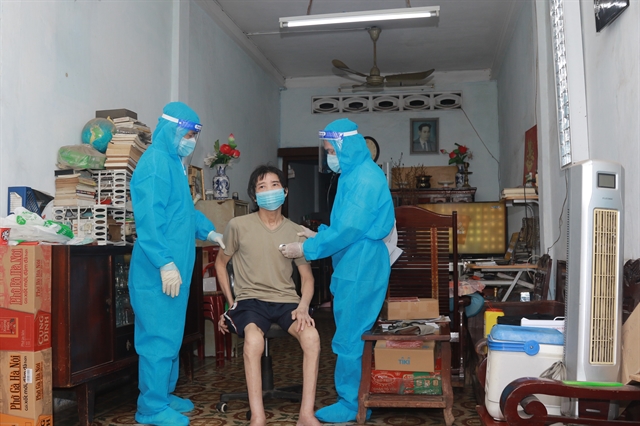
HÀ NỘI — About 67 per cent of people with disabilities said they felt secure and received support during the COVID-19 pandemic, according to a recent assessment.
Nine per cent of people with disabilities said they felt lonely during the pandemic, and 38 per cent said they lost their job and had no income.
The results were in the ‘Rapid Assessment of Socio-Economic Impacts of COVID-19 to Persons with Disabilities in 2021’, which was announced by the UNDP and the Action to the Community Development Centre (ACDC), at a virtual meeting on Thursday.
The assessment was conducted in September 2021 with the participation of 1,792 people with disabilities in 63 provinces and cities, said Đỗ Thanh Huyền, a UNDP public-policy expert.
Of the people surveyed, 91 per cent were from the Kinh group – the main ethnic group of Việt Nam, and the rest from ethnic minorities, she said.
Nguyễn Thị Lan Anh, president of the ACDC, said the assessment showed that the pandemic has substantially impacted people’s lives in the country, especially those with disabilities.
She said that people with disabilities were among the most vulnerable groups suffering from the pandemic.
Career opportunities for people with disabilities have been reduced, and health care activities have also decreased due to the pandemic, she said.
Lường Thị Hải Yến, a woman with visual impairment and owner of a massage shop in Long Biên District, Hà Nội, said the pandemic had severely disrupted her family’s life for two years.
The income from her shop was sharply reduced because it had to close for a long time, she said.
Yến said she had felt distraught because she had no money to raise her children when the shop closed.
Nguyễn Thị Yến Nhi, a hearing-impaired woman working in a soup shop in HCM City, said when she was infected with COVID-19 she received a text from the health centre to instruct her to take care of herself, but could not fully understand it.
“When reading the message there were some words, such as negative and positive, I did not comprehend,” she said.
But people around her failed to explain the words to her using sign language, she said.
Finally, Nhi asked a relative who knows sign language to explain via a video call.
Nhi said she wished she could access more information about the pandemic via sign language to learn about preventing the spread of the pandemic.
Recommendations
Đào Thu Hương, a disability and inclusion officer at UNDP, said a comprehensive assessment from State agencies about the impact of the pandemic on people with disabilities was needed.
More support for people with disabilities should be provided in the future, she said.
Hương also said international organisations and domestic associations for people with disabilities should provide more support in terms of policies. Moreover, the Government should set up more social services to support people with disabilities, especially women and girls.
It is imperative to run sign-language news on national television channels so that people with disabilities can easily find information, she added.
Đinh Mẫn, from the Sponsoring Association for People with Disabilities in Thừa Thiên-Huế, recommended that the Ministry of Labour, Invalids and Social Affairs as well as the Government have a separate support package for people with disabilities affected by the pandemic.
Speaking at the meeting, Đinh Thị Thụy, deputy chief of the National Committee for People with Disabilities, said she appreciated the assessment, but it needed to provide more specific data to better serve policy-making decisions for people with disabilities.
Thụy said, for example, that the assessment should reveal the number of fatal COVID-19 cases in people with disabilities or the severity of the disease when they get it, she added.
“Is the situation of the people with disabilities infecting COVID-19 worse than for able-bodied people infected with COVID-19?” she said.
“We need more specific data for making recommendations for policy-makers.”
Associate Professor Nguyễn Hiền Phương, deputy head of Hà Nội Law University’s Comparative Law Institute, said the assessment would help researchers and policy-makers to gain more data to issue suitable policies for the disabled in future.
Phương suggested that authorised agencies kick-off a team of social workers who specialise in helping people with disabilities.
Việt Nam has 6.2 million people with disabilities. — VnExpress News
- Reduce Hair Loss with PURA D’OR Gold Label Shampoo
- Castor Oil Has Made a “Huge” Difference With Hair and Brow Growth
- Excessive hair loss in men: Signs of illness that cannot be subjective
- Dịch Vụ SEO Website ở Los Angeles, CA: đưa trang web doanh nghiệp bạn lên top Google
- Nails Salon Sierra Madre
 VnExpress News The News Gateway of Vietnam
VnExpress News The News Gateway of Vietnam





